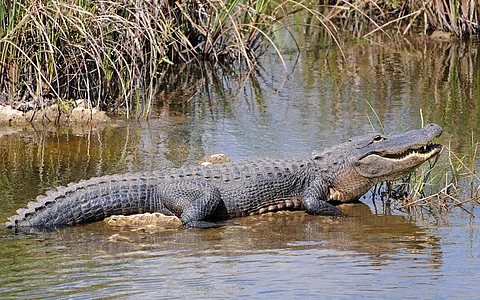

Most attacks by the American Alligator (Alligator mississippiensis) in Florida and the southeastern United States are caused by risky human behaviour and are preventable, according to a new study by scientists at the University of Florida and Centre College in Kentucky.
The researchers developed a ranking system that categorises human actions immediately before an alligator encounter, a statement by the university noted.
They found that some form of human inattention or risk-taking preceded an attack in 96 per cent of recorded incidents. This, according to the researchers, shows that alligator bites are not random but preventable.
The team analysed nearly three centuries of records from 1734 to 2021 on human-alligator interactions using the CrocBITE database, now called CrocAttack.org. It then augmented that information with internet searches, literature review and communications with wildlife agencies. “Each case was classified by the level of human behaviour risk: no risk, low, moderate or high,” the statement added.
Most attacks by alligators took place when people indulged in moderate-risk behaviours such as swimming or wading in alligator-inhabited waters.
Fatal attacks occurred most after high-risk behaviours, such as deliberately entering alligator-inhabited waters. “In contrast, low and no-risk behaviours, like walking near water or simply being present on land, rarely resulted in attacks,” according to the statement.
“The takeaway lesson from this study is that many bites can be prevented if humans are aware of their surroundings and minimise risky behaviours such as walking small pets near bodies of water or swimming where alligators are known to be present,” said Frank Mazzotti, professor of wildlife ecology at UF/IFAS Fort Lauderdale Research and Education Center (FLREC) and an author on the study.
While some attacks happened without clear warning, people in many cases unknowingly triggered the alligator’s natural response to defend itself or to hunt.
This, say the researchers, shows that alligators aren’t seeking conflict, but they will respond when humans provide what scientists call an “attractive stimulus,” such as by splashing, swimming or entering alligator habitats.
The experts recommended wildlife managers adopting diverse, targeted communication strategies to promote safe behaviour around alligators. Increased awareness could dramatically reduce the number of bites and the need to euthanise alligators after attacks, according to them.
Human–Alligator Incidents in the United States: Risky Human Behaviors Cause Most “Attacks” has been published in the journal Human—Wildlife Interactions. The authors include Mazzotti, Mark S Teshera and Azar Kordbacheh.